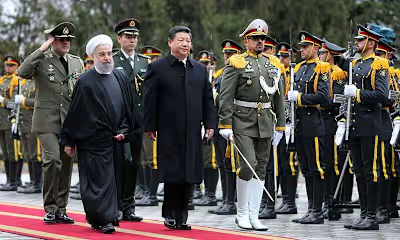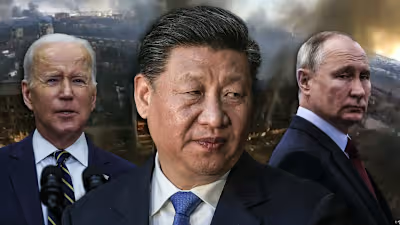Managing Conflict Escalation With Iran as Trump De-escalates th…
By Sam Kessler – Chief & Managing Editor; Contributor
Flags: (L) United States (C) Iraq (R) Iran
The end of 2019 illustrates the ongoing complexities in how the U.S. maneuvers between existing and evolving strategies in the Middle East and in Southeast Asia. However, this maneuvering process requires the effective utilization of developing and implementing viable strategies for both U.S. foreign policy and national security within an international system where great power competition has returned with a vengeance despite the sporadic growth of non-state actors. After all, the U.S. continues to manage a combination of security, economic, and political influences in many realms throughout the world, as the 21st century is showing serious signs of a major restructuring of the post-World War II global system arrangement.
The last couple of months of 2019 experienced a public shift in U.S. foreign policy focus from the China trade dispute to the Middle East by emphasizing on Iranian influences in the region. Explaining this public shift in focus requires a big picture lens in order to more fully understand the complexities and sensitive nature of the situation at hand. After all, the dispute with China is still an ongoing concern despite the creation of a Phase 1 trade agreement that benefits the two nations in the short term. However, the agreement is still limiting in terms of more serious issues being left unresolved on the negotiating table such as regional expansion, cybersecurity, espionage, intellectual property theft, lack of data privacy, illegal fentanyl (opioid) production and distribution, and unfair business and trading practices that violate international laws and impairs the ability of countries to compete effectively. Also, the recent outbreak of the 2019 Novel CoronaVirus (2019-nCov) has grown into a significant global health threat that has geopolitical forecasters and analysts racing to figure out how it will impact the future of U.S.-Sino relations. At this very moment, the full impact of the CoronaVirus is of unknown quality.
(R) U.S. President Trump and China’s Vice Premier Liu He (L) sign partial truce (Phase 1 Agreement) on Wednesday, January 15, 2020. Source: Saul Loeb/AFP
In addition, the U.S. and Iran standoff for the last six months of 2019 witnessed a new norm in conflict escalation management that resulted when the Iranian government realized that their post “Joint Comprehensive Plan of Action” (JCPOA) reaction strategy had failed to produce any real results. The Iranian government would soon learn the extent of the Trump administration’s resolve to force the hand of a much stronger version of the JCPOA deal that would severely limit Iran’s nuclear capabilities. However, the Iranian government responded by continuing the proxy route by utilizing its established network of Shia paramilitary groups that Iran funds and trains throughout the Middle East in Lebanon, Iraq, Yemen, and Syria. The purpose of the proxy shield helps Iran promote and strengthen its control and influence in neighboring states as well as enabling them to unconventionally implement kinetic warfare when required under the guise of plausible deniability.
Regional Map of Iran-Backed Proxy Forces and U.S. Military Forces throughout the Middle East. Source: International Institute for Strategic Studies (IISS)
Thawing the Conflict Within
May 2019 witnessed the beginning of a new round of escalated proxy attacks on U.S. and ally infrastructure throughout the Middle East. Regular attacks on bases, ports, and oil refineries as well as illegally stopping and boarding commercial ships in the Straight of Hormuz created uncertainty in energy and other global markets. In addition, we witnessed a series of naval and aerial drone harassments and attacks between the two nations as well as the continued utilization of remote-controlled suicide bomb boats. Escalation of these proxy attacks during this time period fueled great concern throughout the Western and Middle Eastern worlds.
December 31, 2019 attack on U.S. embassy compound, in Baghdad, Iraq. Source: AP
It is crucial to note that each kinetic event during this period exhibited a level of equal reciprocity between both sides. However, there were strong indications that Iran’s proxies were increasing their attacks during the last three months of 2019 that proved to be damaging and lethal to military installations, personnel, and the public at large. Iraq and its unstable domestic situation would eventually become the catalyst for the new norm when a December 31st attack on the U.S. embassy in Baghdad was initiated by an Iraqi Shia paramilitary group known as Kata’ib Hezbollah (KH). This was a counterattack in response to a series of reciprocated events that began on December 27, 2019, when a Kata’ib Hezbollah rocket had attacked a base in northern Iraq (outside Kirkuk) that killed and wounded U.S. and Iraqi service members as well as a defense contractor.
The United States responded by launching retaliatory airstrikes on five of Kata’ib Hezbollah’s facilities, in which three were located in Iraq and two were in Syria. This was considered by many policy analysts of having been too great of punishment in response to the previous strikes on the U.S. and its allies. However, it indicated that the administration was willing to increase the stakes in order to achieve either a final endgame or as a method of diffusing the tensions that had been brewing for the last six months. As a result, it ended up forcing both sides to reconsider the realities of the situation in their realms of influence. However, an Iranian coordinated attack using Kata’ib Hezbollah and other regional proxy groups on the U.S. embassy in Baghdad, Iraq on December 31st prompted the stakes to rise at a level that Iranian political and military officials may have thought impossible.
Using Iraq’s Domestic Instability as a Catalyst for Creating the New Normal
An attack on the U.S. embassy in Baghdad by Shia paramilitary groups with Iranian backing became a quick reminder to many Americans that the Iraqi domestic situation is still volatile and the country, despite its ongoing domestic uncertainty, actually remains a strategic ally for U.S. operations and regional security efforts in the Middle East. After all, it was a crucial battleground and staging point for crippling ISIS. As a result, it became possible to severely weaken the Islamic caliphate’s leadership and military capabilities throughout the Middle East. The death of ISIS leader Abu Bakr al-Baghdadi in late October 2019 not only created a huge vacuum in its leadership hierarchy but also made it easier to contain and manage its threat escalation potential for the time being.
(L) Iranian Major General Qasem Soleimani (R) Iraqi Militia Commander Abu Mahdi al-Muhandis – Primary Targets of January 2, 2020 airstrike. Source: AFP
A similar approach can also be described in the U.S. handling of the January 2, 2020 aerial drone missile strike that occurred outside a Baghdad airport that killed two top leaders in charge of Iran’s proxy shield in Iraq. The primary official killed was Iranian Major General Qasem Soleimani, who was the head of the Iranian Revolutionary Guard Corps (IRGC) Quds Force division. The second key official killed in this attack had been Abu Mahdi Al Muhandis, who was Kata’ib Hezbollah’s founder and a Deputy Chief of Iraq’s Popular Mobilization Forces (PMF), an umbrella Iraqi Shia militia organization that manages the 40 plus other militias in the region under mainly the direction of Iran’s General Soleimani. The death of these two individuals is considered a big hit on Iranian IRGC’s proxy war efforts and regional strategic positioning.
General Soleimani alone was considered a prime target since he spent the past couple decades leading the IRGC efforts to disrupt and control the region using Shia militia proxies as Iran’s shield and regional influencer. Soleimani’s approach orchestrated a strategy consisting of non-conventional warfare tactics that are now recognized as having camouflaged official responsibility attributed to the Iranian government. Soleimani’s planned attacks and raids have been credited for wounding and killing thousands throughout the Middle East, which also includes U.S. military servicemen in the region.
The U.S. Plays the Trump Card with Soleimani’s Death
It is also important to note that the ISIS war made Iran’s Shia paramilitary proxies more relevant and stronger in the Middle East since it offered an opportunity for them to step up and take advantage of a much weaker and politically fragmented Iraq as well as the entire Middle East region as a whole. In addition, the ISIS war made it significantly possible for Iran’s proxy leadership efforts to streamline the blending of their relationships between Iraq’s Shia community and their country’s political and military establishments.
This had been a growing concern by decision-makers in the U.S. defense and intelligence communities. However, a recent intelligence leak by someone in Iran’s intelligence community in mid-October 2019 illustrated the full extent of how directly Iran’s Islamic Revolutionary Guard Corps, also known as IRGC, influenced the top brass of the Iraqi government. The leak disclosed that the IRGC had developed close contact and influence with high-level members within Iraq’s military and political establishment that go all the way up to recently ousted Prime Minister Adel Abul Mahdi.
Demonstrators gather during a protest after the lifting of the curfew, following four days of nationwide anti-government protests that turned violent, in Baghdad, Iraq October 5, 2019. Source: Reuters/Thaier Al-Sudani
Another damning point that was illustrated in the Iranian intelligence leak had been that the former Iranian Major General, Qasem Soleimani, had often been the primary point of contact. In fact, it was reported that he had very intimate interactions with PM Mahdi and other high-level figures within the Iraqi military and political establishments. This intelligence leak came out in light of major civil unrest occurring within Iraq as well. The domestic situation has gotten worse over the last couple of years while the economy and labor force struggled with the system-wide failure to repair and rebuild the infrastructure that had been destroyed during the ISIS war.
Civil unrest in Iraq has become commonplace but this latest round that began in October 2019 not only consists of a large youth population but is also a movement spreading outside of Baghdad into neighboring regions of the state. A majority of the protests and riots have revolved around the Iraqi government’s inability to bring normalcy back to order while corruption runs rampant. At this point in time, hundreds have died, thousands were listed as wounded from the Iraqi security forces attempts to quell the civil clashes, with an unknown number detained.
Iraqi Political Squabbles Shed Light on Divisions and Failure to Unite in Turmoil
But there’s another part to this story that revolves around the Shia paramilitary groups inside Iraq who grew stronger while fighting ISIS with Iran’s support and direction. First of all, Iraqi Prime Minister Mahdi was ousted as it became public on how close he was to Iran’s Shia proxy militia groups and his close association with General Soleimani. However, he and his caretaker administration have remained in power longer than expected since the Iraqi Congress failed to adequately vote and approve both a replacement prime minister and cabinet. All of this occurred during the remaining months of 2019 while the country’s youth population continued to stage nation-wide protests and riots. February and March 2020 are key months for Iraq as a new PM, Mohammed Tawfiq Allawi, has been decided as the new head of state while cabinet seats remain vacant due to rival political factions squabbling over ministerial portfolios.
Conclusion
Russian President, Vladimir Putin (L) with Turkish President Recep Tayyip Erdogan (R). Moscow and Ankara are on a collision course in Syria. Source: Alexey Druzhinin, Shutterstock
In conclusion, the Iranian tensions in January 2020 that we recently witnessed in Iraq may possibly serve as a conflict diffusor catalyst but most likely serving as a new norm for U.S. Iranian conflict escalation management in the Middle East. In response to General Soleimani’s death, the Iranian government had countered with retaliatory attacks towards U.S. bases with minimal impact on American servicemen. However, the shooting down of a Ukrainian passenger plane while retaliating against Soleimani’s death has led to international criticism of the Iranian government.
At this juncture, open-wide conventional warfare will most likely be severely limited given both sides not looking to go full-scale kinetic anytime soon. However, the asymmetrical route will most likely be the bread and butter approach for both the U.S. and Iranian governments in regard to influencing political and social unrest movements currently being experienced in both Iraq, Iran, and other areas of interest.
Meanwhile, the geopolitical restructuring of the Middle East continues to evolve as Turkey’s conflict with Syrian and Russian forces are threatening to evolve into a new major conflict within Syria’s Idlib province region. This can potentially evolve into a much larger problem if the U.S., Iran, and Iraq triangle are mixed into the equation with a series of asymmetrical warfare, proxy movements, and retaliations throughout the area. Moreover, regional powers like Saudi Arabia and Israel can very easily find themselves getting more involved in this conflict scenario that can potentially include a full-scale NATO presence as well.
_______________________________________________________
Sam Kessler is a freelance writer with a global security, geopolitics, and business/finance background. He also has an M.A. in National Security and Intelligence Analysis from American Military University (AMU), which is part of the American Public University System (APUS). He can be contacted via his website/blog at www.samkessler.com
Like this project
Posted Aug 22, 2024
The U.S. continues to deal with the complexities of maneuvering between existing and evolving strategies in the Middle East and Southeast Asia.
Likes
0
Views
4





